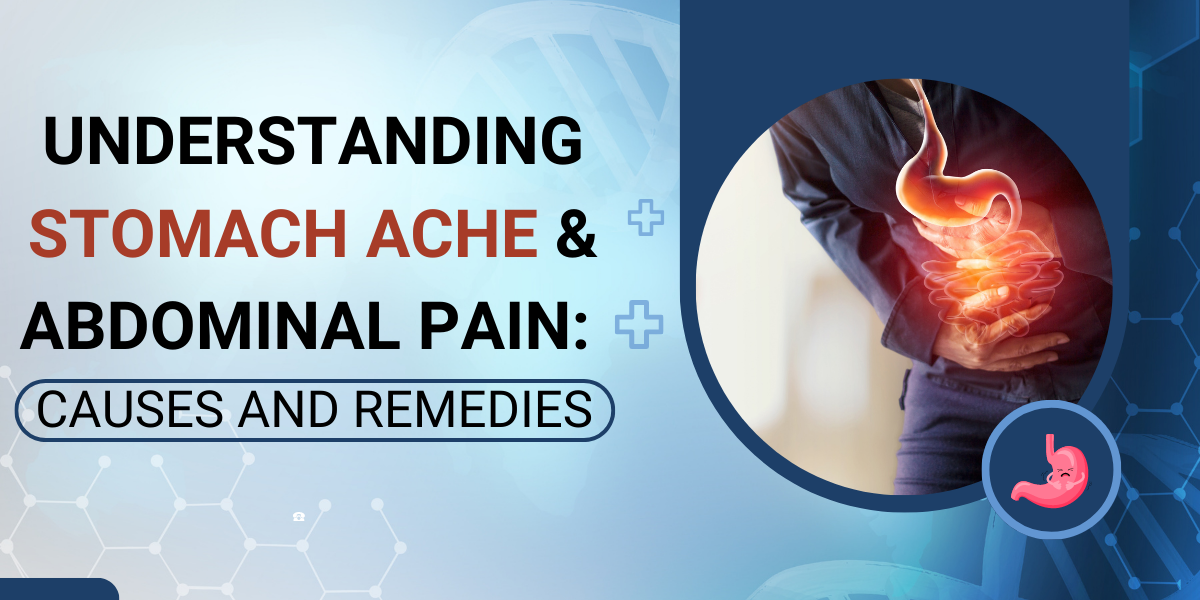Introduction
Stomach ache and abdominal pain are common complaints that can range from mild discomfort to severe agony. These types of pain can originate from various organs within the abdominal cavity and can be caused by a multitude of factors. Understanding the underlying causes and knowing when to seek medical attention is crucial for managing and alleviating such pain effectively.
Causes of Stomach Ache & Abdominal Pain
- Gastrointestinal Infections: Bacterial, viral, or parasitic infections can lead to stomach ache and abdominal issues, often accompanied by symptoms like diarrhea, nausea, and vomiting.
- Indigestion: Overeating, consuming spicy or fatty foods, or eating too quickly can result in indigestion, causing discomfort in the upper abdomen.
- Gastric Ulcers: Open sores that develop on the stomach lining due to factors like H. pylori infection or prolonged use of non-steroidal anti-inflammatory drugs (NSAIDs) can lead to abdominal pain.
- Gallstones: Hardened deposits in the gallbladder can cause sudden and intense pain in the upper right abdomen, often radiating to the back or shoulder.
- Irritable Bowel Syndrome (IBS): A chronic condition characterized by abdominal pain, bloating, and changes in bowel habits.
- Menstrual Cramps: Women may experience lower abdominal pain before or during their menstrual cycle.
- Appendicitis: Inflammation of the appendix can cause sharp pain in the lower right abdomen and requires immediate medical attention.
- Kidney Stones: These small, hard deposits can cause excruciating pain as they pass through the urinary tract.
- Gas and Bloating: Excess gas can lead to abdominal discomfort, often relieved by passing gas or belching.
- Hernia: A bulging of an organ or tissue through a weak spot in the abdominal wall can cause localized pain.
Remedies for Stomach Ache & Abdominal Pain
- Over-the-Counter Pain Relievers: Non-prescription pain relievers like acetaminophen or ibuprofen can provide temporary relief from mild stomach ache and abdominal pain.
- Hot Water Bottle or Heating Pad: Applying heat to the abdomen can help relax muscles and alleviate cramps.
- Hydration: Drinking plenty of water can aid in digestion and prevent constipation, which can contribute to abdominal discomfort.
- Dietary Changes: Avoiding spicy, fatty, and processed foods, and opting for a balanced diet rich in fiber can help prevent indigestion and bloating.
- Probiotics: Consuming foods or supplements containing probiotics can promote a healthy gut and alleviate symptoms of IBS.
- Stress Management: Practicing relaxation techniques like deep breathing, meditation, and yoga can help reduce stress-related stomach and abdominal issues.
- Medication Adjustments: If pain is a side effect of certain medications, consulting a healthcare provider to adjust the dosage or switch medications may be necessary.
- Medical Consultation: Persistent or severe stomach and abdominal pain should not be ignored. Consulting a healthcare professional can help diagnose the underlying cause and provide appropriate treatment.
Conclusion
Stomach ache and abdominal pain can range from mild discomfort to severe distress, impacting daily life and overall well-being. While some cases can be managed with home remedies, it’s important to recognize when medical attention is required. Prioritizing a healthy lifestyle, balanced diet, and stress management techniques can go a long way in preventing and alleviating stomach and abdominal pain. As always, seeking guidance from a healthcare provider is essential for proper diagnosis and effective treatment.





